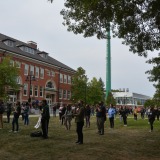
One of our first objectives is to have a better understanding of our own identities and our own biases.
Associate Dean of Student Development Hank Parkinson has seen Fitchburg State evolve in his 14 years on campus, and has seen the push to recognize the importance of identity take center stage. As chair of the university’s Student Affairs Diversity, Equity and Inclusion (DEI) Committee, Parkinson is working with a number of offices on ways to infuse these topics into the campus culture.
“One of our first objectives is to have a better understanding of our own identities and our own biases,” Parkinson said. “I’m a hetero cis male, and I carry every privilege that comes with that. I ask myself every day, ‘How can I use my privilege to effect change, and how can I support our students better?’”
The DEI Committee is constantly planning, he said, as well as listening.
“We’re learning that students are tired of talk, and they want to see action,” Parkinson said. “We have work to do. I always say that. I think we can do better. We need to make sure people of color feel the same sense of belonging that white people do. We need to make sure everyone feels welcomed and safe on campus, and that they are heard.”
Vice President for Student Affairs Laura Bayless said the university’s efforts to engage its Black, indigenous and people of color (BIPOC) population has illustrated some stark realities. “According to the 2018 Climate Survey, our BIPOC students feel as welcome as our white students, but they don’t feel like they belong,” she said. “We hear that ‘Everyone is really nice, but they don’t really get me.’ And that’s what ‘education justice’ and creating a student-ready campus is all about.”
In the fall semester, the 2020 administration of the campus climate survey was sent to students. The results will help guide the university’s efforts to serve its diverse populations and hopefully inspire candid dialogues among all sectors of the campus community, she said.
Bayless also purchased copies of the American Association of Colleges and Universities’ book Becoming a Student-Ready College: A New Culture of Leadership for Student Success for everyone in the Student Affairs division.
The underlying principle of the book is that colleges and universities must make fundamental changes in how they operate to serve first-generation and underrepresented students. Rather than ask why students aren’t ready for college, instead campuses must work to create support systems that will help all students thrive.
“This is a long-term effort that will never end,” Bayless said. “It’s always a journey, not a destination.”
This article was originally published in the Winter 2021 edition of Contact magazine.